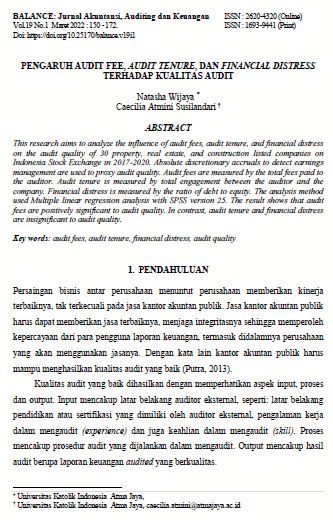PENGARUH AUDIT FEE, AUDIT TENURE, DAN FINANCIAL DISTRESS TERHADAP KUALITAS AUDIT
DOI:
https://doi.org/10.25170/balance.v19i1.3509Keywords:
audit fees, audit tenure, financial distress, audit qualityAbstract
This research aims to analyze the influence of audit fees, audit tenure, and financial distress on the audit quality of 30 property, real estate, and construction listed companies on Indonesia Stock Exchange in 2017-2020. Absolute discretionary accruals to detect earnings management are used to proxy audit quality. Audit fees are measured by the total fees paid to the auditor. Audit tenure is measured by total engagement between the auditor and the company. Financial distress is measured by the ratio of debt to equity. The analysis method used Multiple linear regression analysis with SPSS version 25. The result shows that audit fees are positively significant to audit quality. In contrast, audit tenure and financial distress are insignificant to audit quality.
References
Agoes, S. (2017). Auditing: Petunjuk Praktis Pemeriksaan Akuntan oleh Kantor Akuntan Publik. Salemba Empat.
Al-Thuneibat, A. A., Al Issa, R. T. I., & Ata Baker, R. A. (2011). Do audit tenure and firm size contribute to audit quality?: Empirical evidence from Jordan. Managerial Auditing Journal, 26(4), 317–334.
Andriani, N., & Nursiam, N. (2018). Pengaruh Fee Audit, Audit Tenure, Rotasi Audit Dan Reputasi Auditor Terhadap Kualitas Audit (Studi Empiris Pada Perusahaan Manufaktur yang Terdaftar di Bursa Efek Indonesia Tahun 2013-2015). Riset Akuntansi Dan Keuangan Indonesia, 3(1), 29–39.
Arens, A., Elder, R. and Beasley, M. (2008). Auditing and Assurance Services (12th ed.). Pearson Prentice-Hall, Englewood Cliffs, Nj.
Blankley, A, I, Hurtt, D.N. and MacGregor, J. E. (2012). Abnormal Audit fees and restatements. Auditing: A Jorual of Practice & Theory, 31(1), 79–96.
Daniel. (2014). Mandatory Audit Firm, Kualitas Audit, dan Kualitas Laba. Universitas Katolik Indonesia Atma Jaya, Jakarta.
DeAngelo, L. E. (1981). Auditor Size and Audit Quality. Journal of Accounting and Economics, 183–199.
Deis, D. and Giroux, G. (1992). “Determinants of audit quality in the public sector.” Accounting Review, 67(3), 462–479.
Elevendra, D., & Yunita, N. H. (2019). Pengaruh Audit Tenure dan Auditor Switching Terhadap Kualitas Audit dengan Financial Distress Sebagai Pemoderasi. Jurnal Eksplorasi Akuntans, 3(1), 82–97.
Fauzan Prasetia, I., & Yuniarti Rozali, R. D. (2016). Pengaruh Tenur Audit, Rotasi Audit Dan Reputasi Kap Terhadap Kualitas Audit (Studi Pada Perusahaan Manufaktur Yang Terdaftar Di Bursa Efek Indonesia Tahun 2011-2014). Jurnal ASET (Akuntansi Riset), 8(1), 39. https://doi.org/10.17509/jaset.v8i1.4020
Francis, J.R. and Krishnan, J. (1999). “Accounting accruals and auditor reporting conservatism.” Contemporary Accounting Research, 16(1), 135–165.
Geiger, M.A., & Raghunandan, K. (2002). Auditor Tenure and Audit Reporting Failures. AUDITING: A Journal of Practice & Theory, 21(1), 67–78.
Ghozali, I. (2018). Aplikasi Analisis Multivariate Dengan Program IBM SPSS 25 (9th ed.). Badan Penerbit Universitas Diponegoro.
Hendriksen. (2002). Accounting Theory. Mc Graw Hill: International Edition.
Heninger, W. . (2001). “The association between auditor litigation and abnormal accruals.” The Accounting Review, 76(1), 111–126.
Herawati, T., & Selfia, S. S. (2019). Tinjauan Indikator Kualitas Auditor. Prosiding Festival Riset Ilmiah Manajemen & Akuntansi.
Herianti, E., & Suryani, A. (2016). Pengaruh Kualitas Auditor , Audit Delay dan Audit Tenure Terhadap Kualitas Audit Perbankan yang Terdaftar di BEI Periode 2012-2014. Prosiding Seminar Nasional INDOCOMPAC, 416–425.
Indah, S. N. (2010). Pengaruh Kompetensi dan Independensi Auditor Terhadap Kualitas Audit. Jurnal Fakultas Ekonomi Universitas Diponegoro Semarang.
Indah, S. N. M. (2010). Effect of auditors competence and independence on audit quality (empirical study on KAP auditorin Semarang).
Jayanti, N. M. D. A., & Widhiyani, N. L. S. (2014). Financial Distress Dalam Memoderasi Pengaruh. E-Jurnal Akuntansi Universitas Udayana, 9(3), 668–683.
Jensen, Michael C. dan Meckling, W. H. (1976). Theory of The Firm: Managerial Behavior, Agency Cost, and Ownership Structure. Journal of Financial Economics, 3(4), 305–360.
Kasmir. (2018). Analisis Laporan Keuangan. PT. Raja Grafindo Persada.
Kothari, S. P., Leone, A. J., & Wasley, C. E. (2005). Performance matched discretionary accrual measures. Journal of Accounting and Economics, 39(1), 163–197. https://doi.org/10.1016/j.jacceco.2004.11.002
Kurniasih, M., & Rohman, A. (2014). Pengaruh Fee Audit, Audit Tenure, Dan Rotasi Audit Terhadap Kualitas Audit. Diponegoro Journal of Accounting, 0(0), 549–558.
Lee, D. & Sukartha, I. M. (2017). Fee Audit Sebagai Pemoderasi Pengaruh Auditor Switching dan Audit Tenure Pada Kualitas Audit. E-Jurnal Akuntansi Universitas Udayana, 18(2), 1455–1484.
Mgbame, C.O Eragbhe, E dan Osazuwa, N. (2012). Audit Partner Tenure and Audit Qualiy: An Empirical Analysis. European Journal of Business and Management, 4(7), 154–159.
Myers, J. N., Myers, L. A., & Omer, T. C. (2003). Exploring the Term of the Auditor‐Client Relationship and the Quality of Earnings: A Case for Mandatory Auditor Rotation? The Accounting Review, 78(3), 779–799.
Panjaitan, C. M. (2014). Pengaruh Tenure, Ukuran KAP dan Spesialisasi Auditor terhadap Kualitas Audit. Diponegoro Journal of Accounting, 3(3), 1–12.
Putra, I. G. C. (2013). No Title. Kualitas Audit Kantor Akuntan Publik Di Bali Ditinjau Dari Time Budget Pressure, Risiko Kesalahan, Dan Kompleksitas Audit, 2(2), 765–784.
Watts, R. and Zimmerman, J. (1986). Positive Accounting Theory. Prentice-Hall, Englewood Cliffs, NJ.
Wooten, T. G. (2003). It is Impossible to Know The Number of Poor Quality Audits that simply go undetected and unpublicized. The CPA Journal.
Yuniarti, R. (2011). “Audit Firm Size, Audit Fee and Audit Quality.” Journal of Global Management, 2(1).



